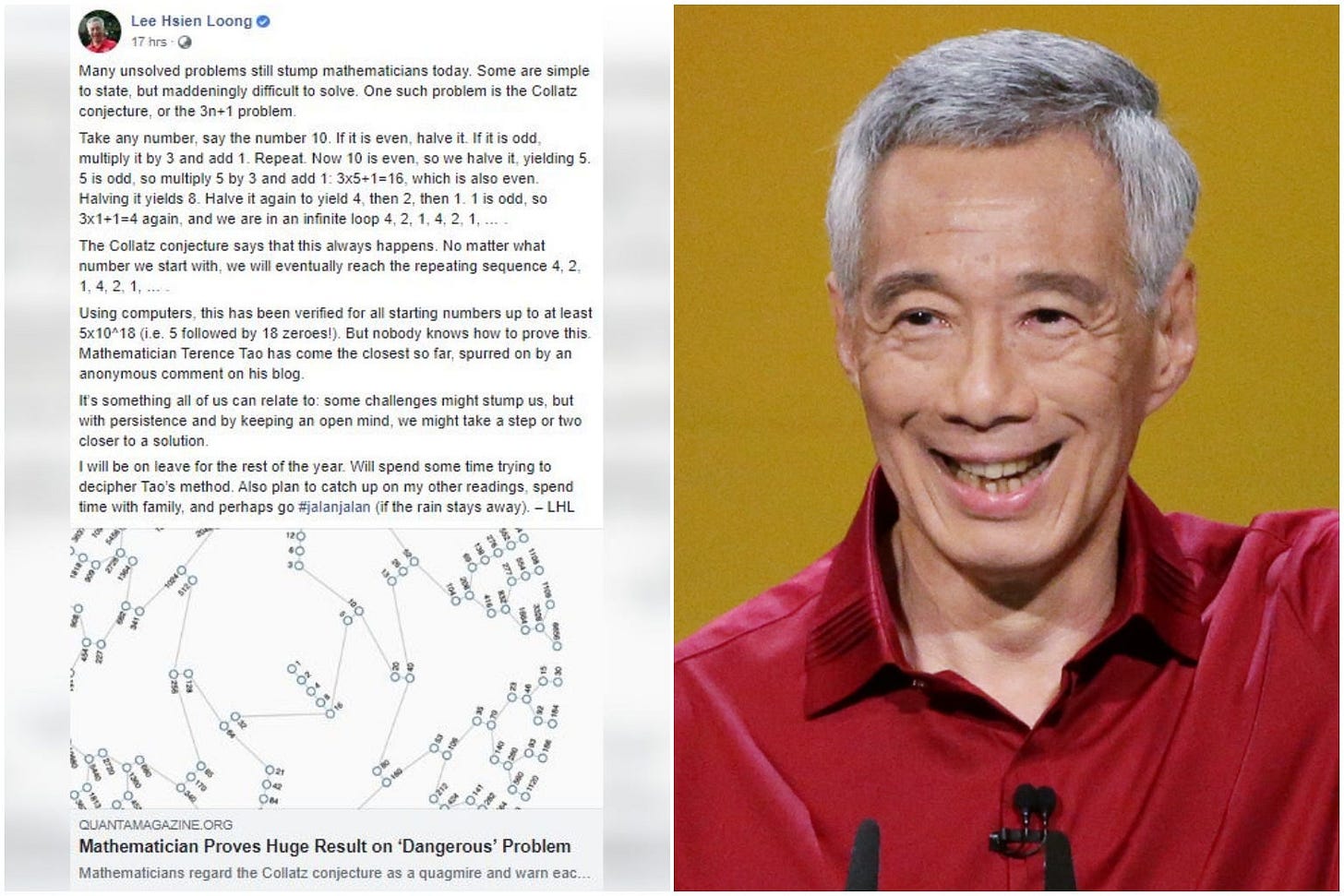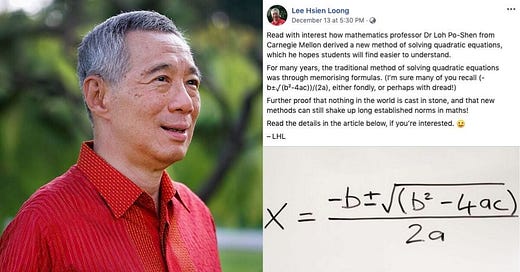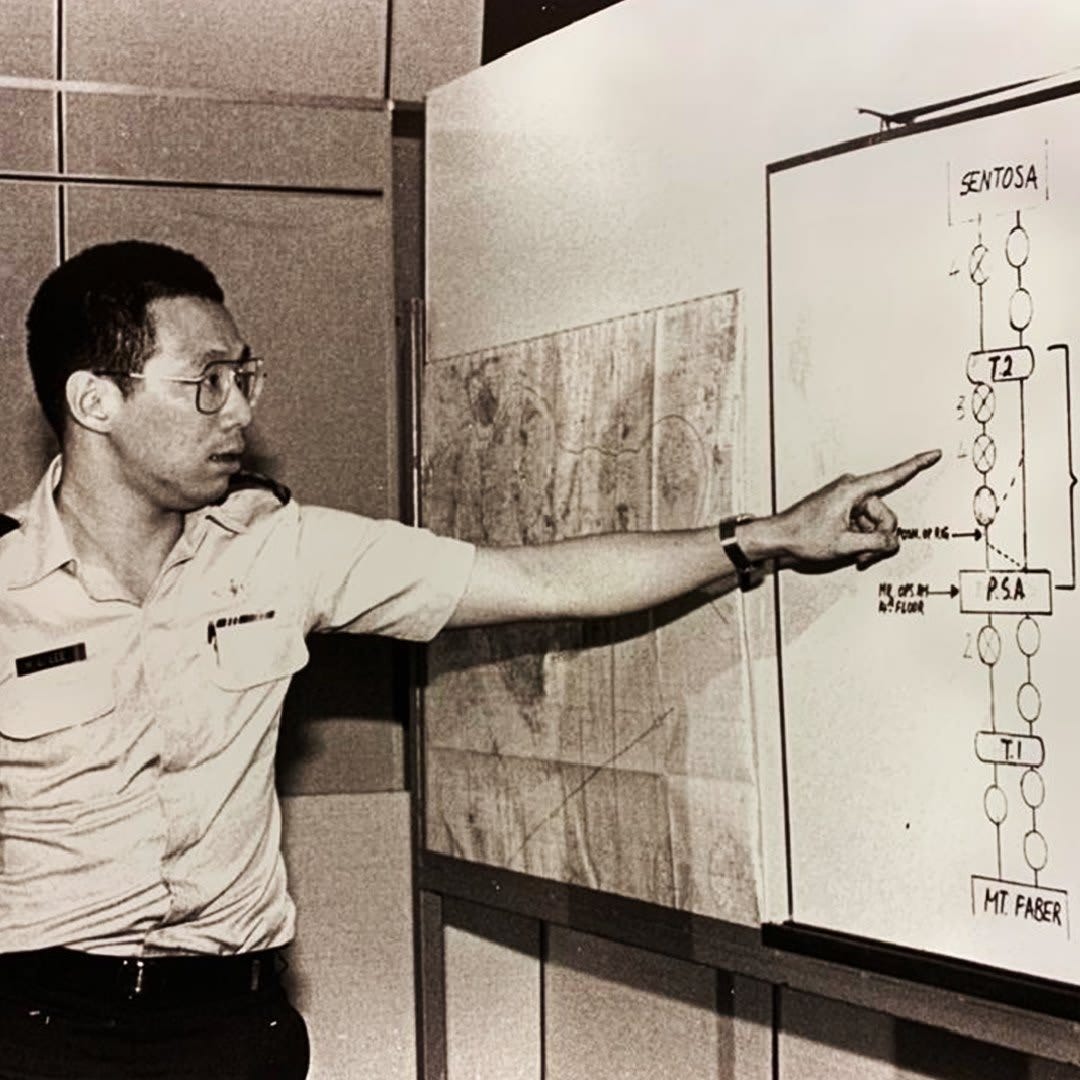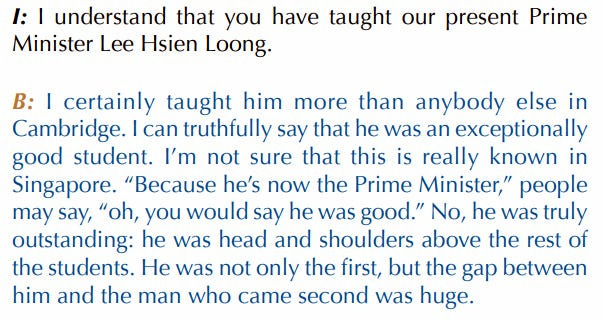Unlike Donald Trump, Prime Minister of Singapore Lee Hsien Loong Can Solve Cambridge University Math Questions
The third prime minister of Singapore was a ‘Senior Wrangler’ and ‘the brightest mathematician he had ever admitted’ according to his tutor Denis Marrian at Cambridge
Recently on Math Games, we covered the viral story of the current US president Donald Trump criticizing the low-level math classes offered at Harvard University. This was brought to my attention thanks to NTTP.
And since then, I have many of the wonderful readers of Math Games have shared their sentiments around this subject, sparking lots of funny and amusing anecdotes around math and Trump. What caught my eye was a a comment from John E Pearson, who shared with us a video of the Trumps failing so miserably at basic arithmetic. Yeah you read that right! It’s not even math, it’s a question of simple multiplication. (Can you multiply 17 by 6?)
So I thought there’s no better way to enjoy the roller coaster of president math by going from struggling with toddler math to faring so well in one of the hardest math programs in the world. Not only did this man completed the grueling and intense mathematics degree at the University of Cambridge, he also came out on top with flying colors as the ‘Senior Wrangler’.
Let’s welcome the third president of Singapore, Lee Hsien Loong to today’s post!
Born on 10 February 1952 in colonial Singapore, Lee Hsien Loong is the eldest son of founding prime minister Lee Kuan Yew. In 1971 he won both the President’s Scholarship and the SAF Overseas Scholarship to read mathematics at Trinity College, Cambridge, and in 1973 emerged as Senior Wrangler, the top scorer in the famously rigorous Mathematical Tripos.
He then graduated in 1974 with first-class honors in mathematics and a Distinction in the Diploma in Computer Science, prompting his tutor Denis Marrian to call him ‘the brightest mathematician he had ever admitted.’
After completing a Mason Fellowship and an MPA at Harvard Kennedy School in 1980, Lee returned to Singapore to begin a career in public service — armed, from the very start, with credentials few world leaders can match.
To understand how profoundly extraordinary Lee was as a math student at Cambridge, I found some commentaries and old interview dialogues from this blog post by ddcolrs.
Quoting directly from the post:
At Cambridge, LHL earned a double-first honors degree for mathematics, and was also recognized as senior wrangler. However, he has never had the opportunity to apply his superlative mathematical abilities to benefit Singapore.
In 1971, Lee studied mathematics in Cambridge University’s Trinity College. Two years later, he graduated top of his class, becoming the first senior wrangler ever from Singapore. A senior wrangler is the top mathematics undergraduate at Cambridge and is one of the greatest intellectual achievements attainable in Britain.
That’s not all; Lee scored a comfortable first. He earned 31 alpha questions — which are questions where distinctions are given for the best answers — and the student who came in second scored a distant 19.
Senior wranglers like PM Lee have gone on to play leading figures in the world of mathematics, physics and other fields. So it came as a surprise — to his tutor especially — that Lee turned down a career as an elite academic to focus on military and politics.
Choosing His Country Over Academic Fame
Young Lee explained in a letter to his tutor that he “will never be a mathematician.”
“A mathematician really has little say in what goes on in the world around him, in the way things are going on in the country. This does not matter at all in a large developed country like Britain, but in Singapore, it would matter very much to me.
“It does not mean I have to go into politics, but an important member of the civil service or the armed forces is in a position to do a great deal of good or harm. I would prefer to be doing things and perhaps be cursed by other people than have to curse at someone else and not be able to do any more.
An Interview with Cambridge Mathematics Professor Bela Bollabos who said that the runner-up to LHL’s senior wrangler achievement became a world-class mathematician
Another interview with Professor Bollobas
Though the time might not have been right for LHL to apply his superlative mathematical abilities upon his Cambridge graduation, perhaps the time is now right for LHL to use SG 1000 to grow Singapore.
Just as math-based money (cryptocurrency) can transform the financial system, so too can math-driven creativity transform innovation. And with his superlative mathematical skills, LHL can lead the world …

Before we take a look at some of the questions on the Cambridge University math exams, also known at the Mathematical Tripos, I just want to highlight what he said here.
A mathematician really has little say in what goes on in the world around him, in the way things are going on in the country. This does not matter at all in a large developed country like Britain, but in Singapore, it would matter very much to me.
In many ways, I vibe with this. I have this belief that modern day mathematicians aren’t as influential or important as some bookworms and math nerds romanticize them to be.
A truly intelligent and wise person can see beyond the intricate minutiae and finitude of mathematics, in the context of civilizations and the universe. In the grand scheme of things really.
But at the same time, a capable leader perhaps wields the intellectual arsenal to achieve great heights in highly abstract and philosophical disciplines.
In many ways Lee Hsien Loong lies in the in the intersection of this particular Venn diagram.
Speaking of Venn diagrams, how about we tackle a probability question from the Mathematical Tripos together?
A Cambridge University Exam Question
Presumably Lee got awarded the Senior Wrangler award when he took his exams in 1973. Unfortunately for us, I have not been able to access the 1973 Mathematical Tripos paper. But if you do have access to it, please let me know!
Now this problem comes from the probability section of a year one undergraduate math exam at Cambridge. I suppose it’s orders of magnitude easier than what Lee took in 1973, but certainly orders of magnitude harder than multiplying 17 by 6, which Trump failed to do.
As the regular readers of Math Games know, it’s time to grab your pen and paper and give this a go. When you are ready, keep reading for the solution.
Keep reading with a 7-day free trial
Subscribe to Math Games to keep reading this post and get 7 days of free access to the full post archives.









